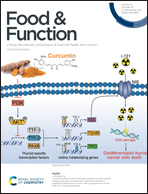Curcumin induced the cell death of immortalized human keratinocytes (HaCaT) through caspase-independent and caspase-dependent pathways†
Abstract
Curcumin is a diketone compound found in turmeric. It is used as food additives and spices, and has anti-proliferation and anti-cancer properties. However, the effect of curcumin on human keratinocytes (KCs) is still unclear. In this study, curcumin dramatically inhibited the cell growth of immortalized human KCs (HaCaT) and arrested the cells at the G2/M phase, with an apoptosis rate of 33.95% after 24 μM curcumin treatment. HaCaT cells showed changes in typical apoptotic morphology and the configuration of nuclear matrix-intermediate filaments (NM-IFs) after treatment with curcumin. We identified 16 differentially expressed nuclear matrix (NM) proteins, including apoptosis inducing factor (AIF) and caspase 3, by 2-DE and MALDI-TOF/TOF mass spectrometry. The expression of AIF decreased in the mitochondria and increased in the nucleus. Immunofluorescence assays showed that AIF was released from the mitochondria to the nucleus. AIF silencing and caspase inhibitor (z-vad-fmk) both lead to HaCaT cells being insensitive to apoptosis induced by curcumin. Meanwhile, after curcumin treatment, mitochondrial membrane depolarization led to cytochrome c release from the mitochondria to the cytoplasm, and the ratio of Bax to Bcl-2 in HaCaT cells was also increased, which subsequently initiated the activation of caspase-3. These results suggest that curcumin-induced apoptosis of HaCaT cells occurs not only through the caspase-dependent pathway but also through the caspase-independent pathway. This discovery enhances the development and utilization of curcumin and provides possible evidence for the treatment of proliferative skin diseases, including skin cancer.



 Please wait while we load your content...
Please wait while we load your content...